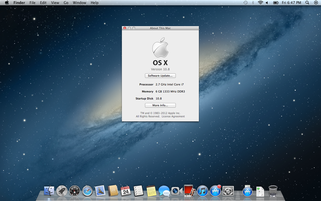OS X Mountain Lion (version 10.8) is the ninth major release of OS X (formerly Mac OS X), Apple Inc.'s desktop and server operating system for Macintosh computers. OS X Mountain Lion was released on July 25, 2012 for purchase and download through Apple's Mac App Store, as part of a switch to releasing OS X versions online and every year.

OS X Mountain Lion was officially announced by Apple on their website on February 16, 2012, as a successor to Mac OS X 10.7 Lion.
System requirements
The most basic system requirements of OS X Mountain Lion are 2 GB of RAM, 8 GB of available storage, and OS X 10.6.8 or later. The earliest models supported in Mountain Lion are the mid-2007 iMac, late 2008 aluminum or early 2009 unibody polycarbonate MacBook, mid-2007 MacBook Pro, late 2008 MacBook Air, early 2009 Mac Mini, early 2008 Mac Pro, or early 2009Xserve Mac Pro models released as early as 2006 can run Mountain Lion unofficially using an upgraded graphics card and EFI64 simulation. The iMac, Mac Mini, MacBook Air, and MacBook Pros released in 2011 or after support AirPlay Mirroring. The same models support AirDrop that did in OS X Lion, the earliest being the late-2008 MacBook Pro, late-2010 MacBook Air, late-2008 MacBook, mid-2010 Mac Mini, or early-2009 Mac Pro with an AirPort Extreme card.
System requirements
The most basic system requirements of OS X Mountain Lion are 2 GB of RAM, 8 GB of available storage, and OS X 10.6.8 or later. The earliest models supported in Mountain Lion are the mid-2007 iMac, late 2008 aluminum or early 2009 unibody polycarbonate MacBook, mid-2007 MacBook Pro, late 2008 MacBook Air, early 2009 Mac Mini, early 2008 Mac Pro, or early 2009Xserve Mac Pro models released as early as 2006 can run Mountain Lion unofficially using an upgraded graphics card and EFI64 simulation. The iMac, Mac Mini, MacBook Air, and MacBook Pros released in 2011 or after support AirPlay Mirroring. The same models support AirDrop that did in OS X Lion, the earliest being the late-2008 MacBook Pro, late-2010 MacBook Air, late-2008 MacBook, mid-2010 Mac Mini, or early-2009 Mac Pro with an AirPort Extreme card.
New Features
- support for an upcoming networking protocol, 802.11ac, also known as 5G WiFi (which implies the release of new Macintosh hardware as well);
- slight improvements to battery life on MacBook computers;
- Wi-Fi wake-from-sleep reconnection issues;
- fixes for graphical glitches caused by some NVIDIA cards;
- better Microsoft Exchange compatibility;
- VoiceOver compatibility with text in PDF documents;
- a new version of Safari (6.0.5);
- a fix for FaceTime issues with non-US-style phone numbers;
- a fix that prevents scheduled sleep times;
- drivers for Geforce GTX Titan graphics card.
- support for an upcoming networking protocol, 802.11ac, also known as 5G WiFi (which implies the release of new Macintosh hardware as well);
- slight improvements to battery life on MacBook computers;
- Wi-Fi wake-from-sleep reconnection issues;
- fixes for graphical glitches caused by some NVIDIA cards;
- better Microsoft Exchange compatibility;
- VoiceOver compatibility with text in PDF documents;
- a new version of Safari (6.0.5);
- a fix for FaceTime issues with non-US-style phone numbers;
- a fix that prevents scheduled sleep times;
- drivers for Geforce GTX Titan graphics card.
 RSS Feed
RSS Feed